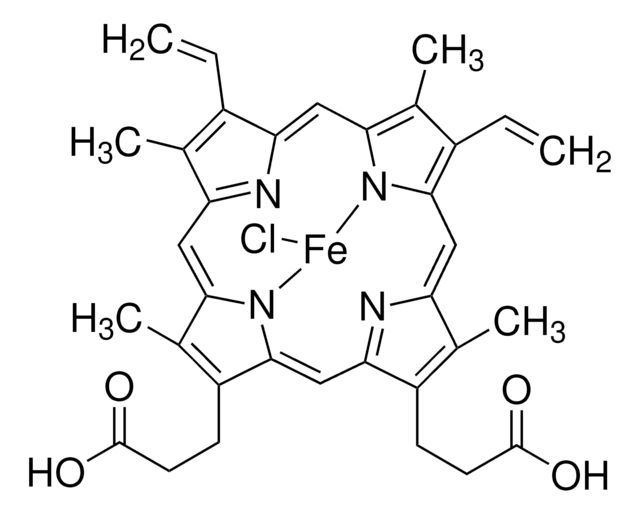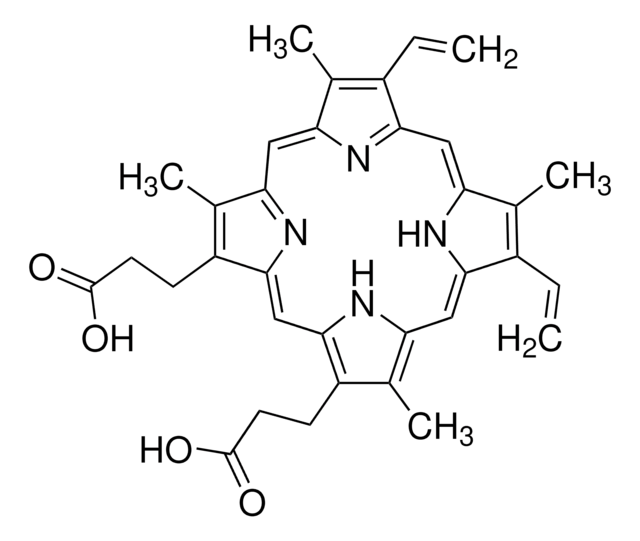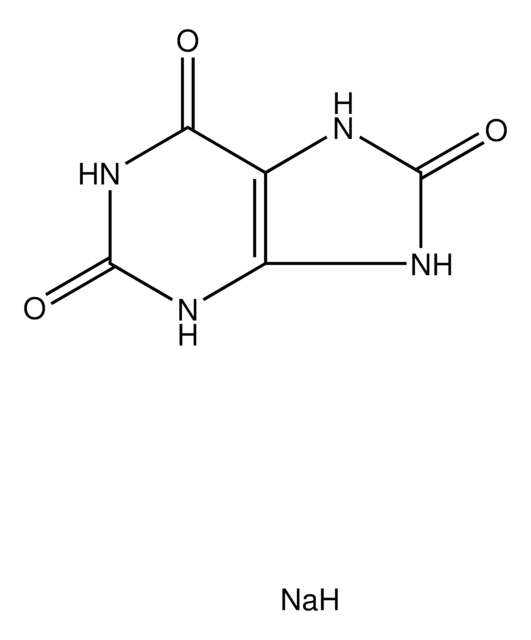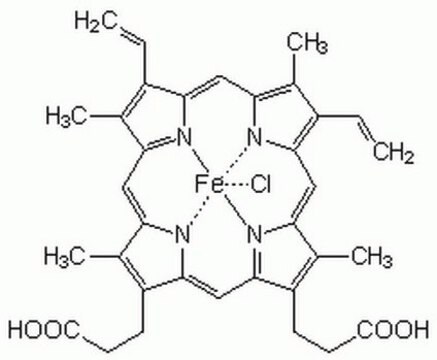H6390
Hemin−Agarose
Type I, saline suspension
Se connecterpour consulter vos tarifs contractuels et ceux de votre entreprise/organisme
About This Item
Produits recommandés
Source biologique
hemin from bovine
Niveau de qualité
Type
Type I
Forme
saline suspension
Ampleur du marquage
≥4 μmol (per ml)
Technique(s)
affinity chromatography: suitable
Matrice
Cross-linked 4% beaded agarose
Activation de la matrice
epoxy
Fixation de matrice
carboxyl
Espaceur de matrice
12 atoms
Adéquation
suitable for chromatography
Température de stockage
2-8°C
Application
Hemin Type I-agarose is an agarose conjugate in saline suspension used in affinity chromatography, protein chromatography and specialty resins. Hemin-agarose has been used to evaluate protection against invasion by Gram-negative bacteria.
Forme physique
Suspension in 0.5 M NaCl containing preservative
Code de la classe de stockage
12 - Non Combustible Liquids
Classe de danger pour l'eau (WGK)
WGK 3
Point d'éclair (°F)
Not applicable
Point d'éclair (°C)
Not applicable
Faites votre choix parmi les versions les plus récentes :
Déjà en possession de ce produit ?
Retrouvez la documentation relative aux produits que vous avez récemment achetés dans la Bibliothèque de documents.
Les clients ont également consulté
Inducible glutathione S-transferase (IrGST1) from the tick Ixodes ricinus is a haem-binding protein
Perner J, et al.
Insect Biochemistry and Molecular Biology, 95, 44-54 (2018)
S Yamamoto et al.
FEMS microbiology letters, 128(2), 195-200 (1995-05-01)
Several clinical isolates of Vibrio parahaemolyticus were examined for their ability to utilize either hemin or hemoglobin as a sole source of iron. Both compounds appeared to be equally good iron sources. Maximum growth was obtained at 5 microM hemin
Hye-Jung Lee et al.
Journal of experimental botany, 63(16), 5967-5978 (2012-09-20)
The Arabidopsis thaliana L. SOUL/haem-binding proteins, AtHBPs belong to a family of five members. The Arabidopsis cytosolic AtHBP1 (At1g17100) and AtHBP2 (At2g37970) have been shown to bind porphyrins and metalloporphyrins including haem. In contrast to the cytosolic localization of these
C S Bracken et al.
Journal of bacteriology, 181(19), 6063-6072 (1999-09-28)
The abilities of two bacterial active heme transporters, HmbR of Neisseria meningitidis and HemR of Yersinia enterocolitica, to use different heme sources were compared. While HmbR-expressing cells used only hemoglobin (Hb) and heme, HemR-expressing bacteria were able to grow on
Swapna Asuthkar et al.
Infection and immunity, 75(9), 4582-4591 (2007-06-20)
In an earlier study, based on the ferric enterobactin receptor FepA of Escherichia coli, we identified and modeled a TonB-dependent outer membrane receptor protein (LB191) from the genome of Leptospira interrogans serovar Lai. Based on in silico analysis, we hypothesized
Notre équipe de scientifiques dispose d'une expérience dans tous les secteurs de la recherche, notamment en sciences de la vie, science des matériaux, synthèse chimique, chromatographie, analyse et dans de nombreux autres domaines..
Contacter notre Service technique









